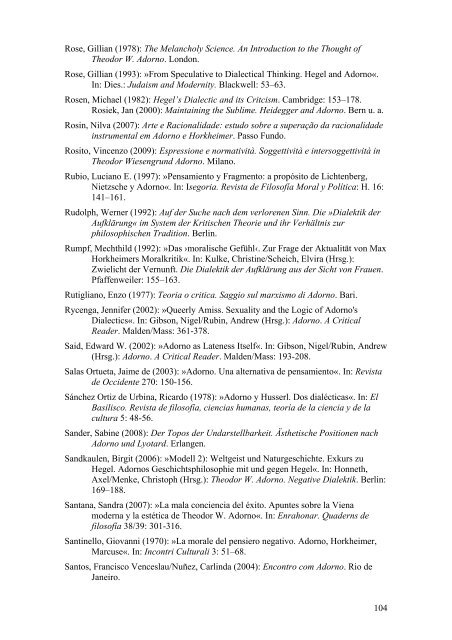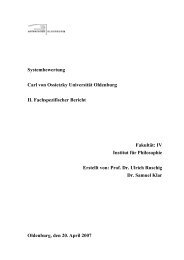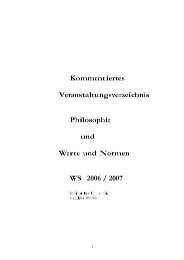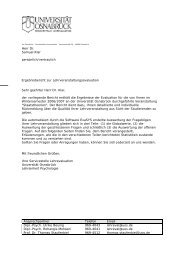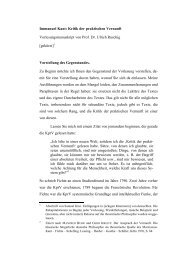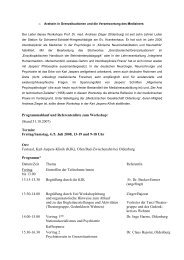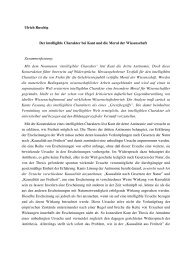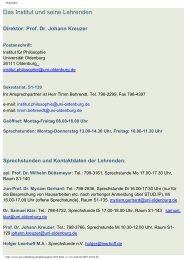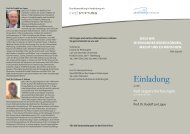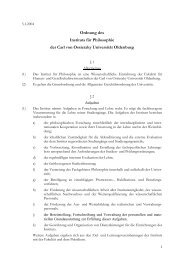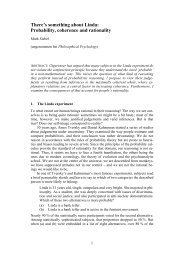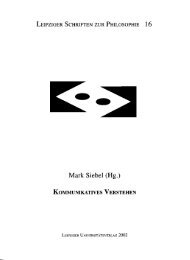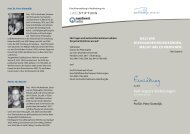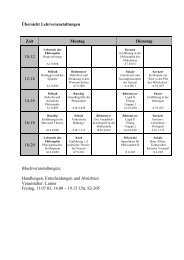Leben - Institut für Philosophie
Leben - Institut für Philosophie
Leben - Institut für Philosophie
Erfolgreiche ePaper selbst erstellen
Machen Sie aus Ihren PDF Publikationen ein blätterbares Flipbook mit unserer einzigartigen Google optimierten e-Paper Software.
Rose, Gillian (1978): The Melancholy Science. An Introduction to the Thought of<br />
Theodor W. Adorno. London.<br />
Rose, Gillian (1993): »From Speculative to Dialectical Thinking. Hegel and Adorno«.<br />
In: Dies.: Judaism and Modernity. Blackwell: 53–63.<br />
Rosen, Michael (1982): Hegel’s Dialectic and its Critcism. Cambridge: 153–178.<br />
Rosiek, Jan (2000): Maintaining the Sublime. Heidegger and Adorno. Bern u. a.<br />
Rosin, Nilva (2007): Arte e Racionalidade: estudo sobre a superação da racionalidade<br />
instrumental em Adorno e Horkheimer. Passo Fundo.<br />
Rosito, Vincenzo (2009): Espressione e normatività. Soggettività e intersoggettività in<br />
Theodor Wiesengrund Adorno. Milano.<br />
Rubio, Luciano E. (1997): »Pensamiento y Fragmento: a propósito de Lichtenberg,<br />
Nietzsche y Adorno«. In: Isegoria. Revista de Filosofía Moral y Política: H. 16:<br />
141–161.<br />
Rudolph, Werner (1992): Auf der Suche nach dem verlorenen Sinn. Die »Dialektik der<br />
Aufklärung« im System der Kritischen Theorie und ihr Verhältnis zur<br />
philosophischen Tradition. Berlin.<br />
Rumpf, Mechthild (1992): »Das ›moralische Gefühl‹. Zur Frage der Aktualität von Max<br />
Horkheimers Moralkritik«. In: Kulke, Christine/Scheich, Elvira (Hrsg.):<br />
Zwielicht der Vernunft. Die Dialektik der Aufklärung aus der Sicht von Frauen.<br />
Pfaffenweiler: 155–163.<br />
Rutigliano, Enzo (1977): Teoria o critica. Saggio sul marxismo di Adorno. Bari.<br />
Rycenga, Jennifer (2002): »Queerly Amiss. Sexuality and the Logic of Adorno's<br />
Dialectics«. In: Gibson, Nigel/Rubin, Andrew (Hrsg.): Adorno. A Critical<br />
Reader. Malden/Mass: 361-378.<br />
Said, Edward W. (2002): »Adorno as Lateness Itself«. In: Gibson, Nigel/Rubin, Andrew<br />
(Hrsg.): Adorno. A Critical Reader. Malden/Mass: 193-208.<br />
Salas Ortueta, Jaime de (2003): »Adorno. Una alternativa de pensamiento«. In: Revista<br />
de Occidente 270: 150-156.<br />
Sánchez Ortiz de Urbina, Ricardo (1978): »Adorno y Husserl. Dos dialécticas«. In: El<br />
Basilisco. Revista de filosofía, ciencias humanas, teoría de la ciencia y de la<br />
cultura 5: 48-56.<br />
Sander, Sabine (2008): Der Topos der Undarstellbarkeit. Ästhetische Positionen nach<br />
Adorno und Lyotard. Erlangen.<br />
Sandkaulen, Birgit (2006): »Modell 2): Weltgeist und Naturgeschichte. Exkurs zu<br />
Hegel. Adornos Geschichtsphilosophie mit und gegen Hegel«. In: Honneth,<br />
Axel/Menke, Christoph (Hrsg.): Theodor W. Adorno. Negative Dialektik. Berlin:<br />
169–188.<br />
Santana, Sandra (2007): »La mala conciencia del éxito. Apuntes sobre la Viena<br />
moderna y la estética de Theodor W. Adorno«. In: Enrahonar. Quaderns de<br />
filosofía 38/39: 301-316.<br />
Santinello, Giovanni (1970): »La morale del pensiero negativo. Adorno, Horkheimer,<br />
Marcuse«. In: Incontri Culturali 3: 51–68.<br />
Santos, Francisco Venceslau/Nuñez, Carlinda (2004): Encontro com Adorno. Rio de<br />
Janeiro.<br />
104


